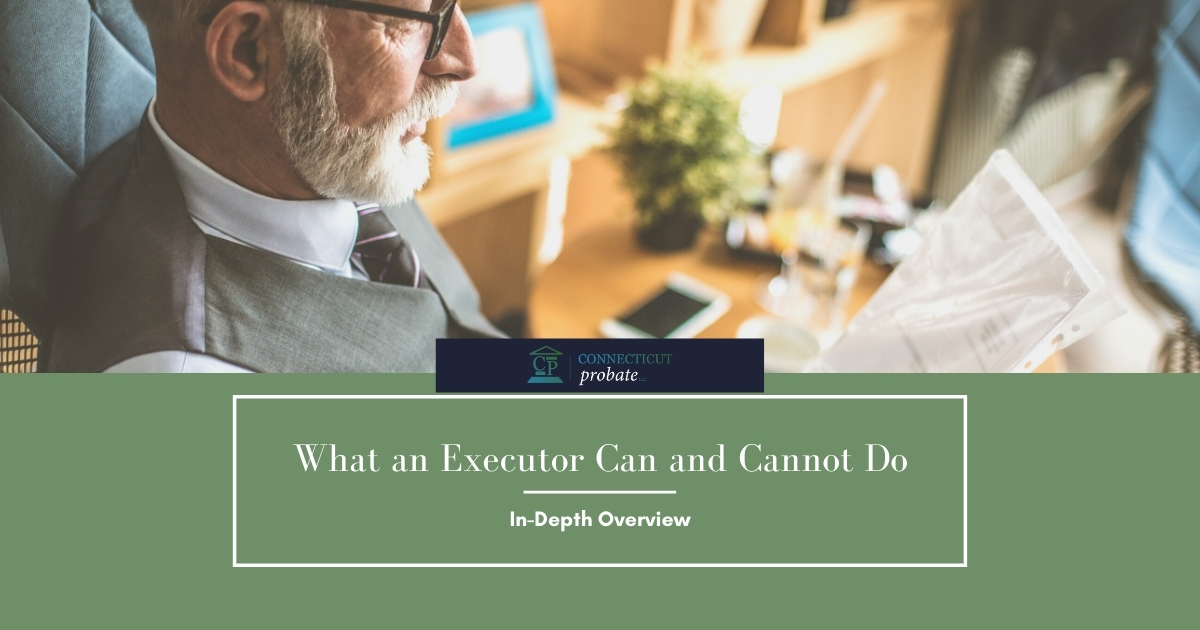
Being appointed to serve as someone’s executor can be a big, and sometimes overwhelming, responsibility.
Essentially, the executor is trusted with protecting and managing the person’s personal property and are bound to carry out their responsibilities as an executor with honesty, trust, and good faith. This is called a fiduciary duty.
In this article, we are going to help you as the appointed executor, beneficiaries, or other interested parties to get a better understanding of what an executor can and cannot do.
Let’s dive right in.


Who is the Executor of an Estate? – Executor Definition
The executor of an estate (or an executrix, if the executor is female) is an individual who has been appointed to carry out the instructions to manage the affairs and wishes of a deceased person’s estate.
They are typically appointed by the individual who makes the will, or if there is no will, a court will appoint an Administrator / Administratrix which is a very similar position.


What an Executor Cannot Do
The appointed executor of an estate cannot act against the final wishes of the deceased individual, terms of the will, court order, their fiduciary duty, or beneficiaries.
Executors cannot do things that intentionally, or unintentionally, neglect the estate, beneficiaries, or heirs.
Let’s go into further detail with some of the most frequently asked questions about what an executor cannot do.
Can an Executor Override a Beneficiary?
No, the executor is bound by a fiduciary duty to act in the best interest of the estate and its beneficiaries. Without the permission of all those named in the Will, and approval of the Court, the executor can not make changes to the estate.
Can an Executor Withhold Money From a Beneficiary?
No, legally executors are obligated to carry out the final wishes as instructed by the decedent or comply with court orders.
However, wills can not always be carried out as instructed. For example, a property that the testator no longer owns, cannot be passed to a beneficiary. Also, typically, if the deceased person still has remaining debt, this must be paid out of their estate immediately which can reduce the amount available for the beneficiaries. Due to the legal order of priority, this may reduce how much beneficiaries will actually receive.
Can the Executor of an Estate or Will Take Everything?
No, executors are fiduciaries, which means that they are entrusted and legally obligated to put the interests of the estate before their own.
They must act with:
- Trust
- Diligence
- Good Faith
- Honesty
“Taking everything” in an estate can not be done unless the Testator made the Executor the sole beneficiary.
Executor Not Communicating with Beneficiaries
When the appointed executor of a will is not communicating with beneficiaries in the probate process, they are essentially breaching their fiduciary duties.
Executors are bound to keep beneficiaries, and other involved parties, up-to-date reasonably. If they neglect to do so, beneficiaries can file a petition with the probate court to hold the executor responsible for communicating in a timely manner.
Before going to this extent, beneficiaries need to make several attempts to reach the executor or their probate attorney before moving forward with a court petition.
Can an Executor Sell Property to Themself?
An executor is tasked with the upheld responsibility to manage the assets of a deceased individual. If the executor misappropriates the assets entrusted to him, this is known as embezzlement, a serious breach of the executor’s fiduciary responsibilities.
Also known as self-dealing, an executor can only sell a property to themselves if it is bought at fair market value and typically only if the Will document specifically permits self-dealing (not uncommon when a family member is both Executor and Beneficiary).
Can an Executor of a Will Sell Property Without All Beneficiaries Approving?
If a will does not give specific instructions, the executor can sell the property but must notify all beneficiaries and get prior approval from the Court.
What If the Executor Does Not Probate the Will
In Connecticut, the person in possession of the original Will (which may or may not be the Executor) has the responsibility of filing the Will within a specific period of time.
Once the Will is filed, the Executor named in the Will may file an Application to be formally appointed by the Court.
However, if he / she doesn’t do so in a reasonable amount of time, anyone else can file an Application and ask for the Successor Executor to be appointed, or even someone that is not named in the Will.
In the end, it’s up to the Court to make the final decision as to who will serve.
Even if the will is old and the beneficiaries have passed away or can’t be located, the will still must be filed with the court.
Does the Executor of a Will Have the Final Say?
The Executor must follow the instructions set forth in the Will and cannot replace those instructions with his own preferences.
Any ambiguity in the language is resolved by the Court, so if a provision is unclear, the Executor must file a Motion with the Court for guidance.
What To Do if Executor Does Not Follow the Will
Most of the time, an Executor will hire a Connecticut probate attorney to represent them properly.
The Connecticut probate court judge and personnel supervise the work that the executor carries out. The court can remove an executor who is not complying with the law, who is not following the will & testaments, or who is not fulfilling their fiduciary duties. The court can, and often does, appoint a new personal representative in those situations.
If you, a beneficiary, believe that the executor is not meeting his/her duties & responsibilities, you can petition the Connecticut probate court for the executor’s removal. If you wish to proceed with this step, it is strongly suggested that you consult with a Connecticut probate attorney as an initial step.